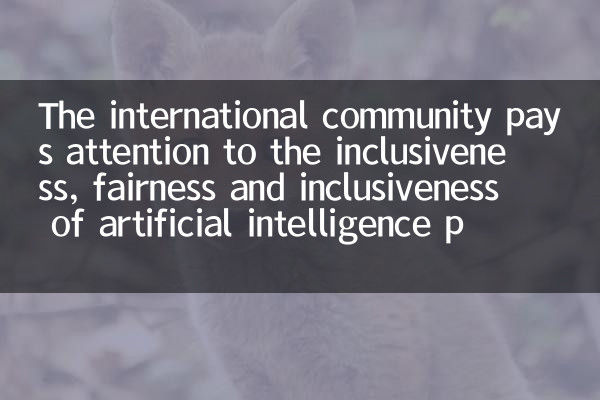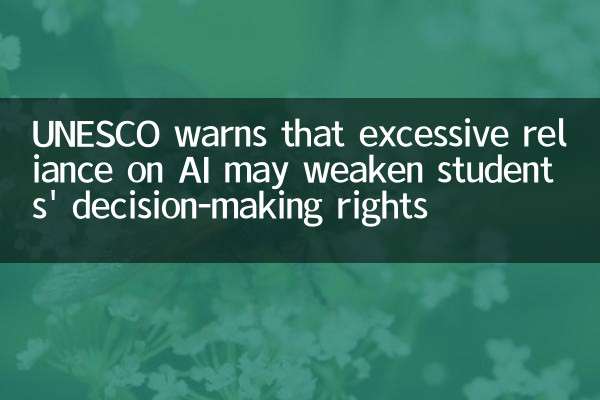The international community pays attention to the inclusiveness, fairness and inclusiveness of artificial intelligence products
In recent years, artificial intelligence (AI) technology has developed rapidly and has gradually penetrated into various fields of social life. However, with the popularity of AI applications, the international community's attention to its inclusiveness, fairness and inclusion is also increasing. In the past 10 days, many hot topics related to AI ethics have emerged around the world, causing widespread discussion. This article will combine structured data to analyze the current focus of the international community on the "three characteristics" of AI products.
1. Overview of global AI hot topics

By analyzing the hot topics in the past 10 days, we found that AI ethics issues have become one of the core issues of the international community. The following are recent hot events related to AI inclusiveness, fairness and inclusion:
| date | Hot events | Countries/organizations involved |
|---|---|---|
| 2023-11-01 | United Nations releases global AI ethics initiative | United Nations, 193 member states |
| 2023-11-03 | The EU passes amendment to the Artificial Intelligence Act, emphasizing fairness | 27 EU countries |
| 2023-11-05 | African countries jointly call for the inclusive development of AI technology | 55 member states of the African Union |
| 2023-11-07 | Global AI Ethics Summit is held to focus on inclusive design | 30 countries including the United States, the United Kingdom, China |
2. Global Challenges and Progress of AI Inclusiveness
AI inclusiveness means that technology should benefit all groups, especially vulnerable groups. However, there is a significant imbalance in the current global AI development. Here are the main challenges and progress:
| challenge | data | progress |
|---|---|---|
| Inequality in technology acquisition | 70% of the world's AI patents are concentrated in the United States, China and Japan | The United Nations launches AI for All Program |
| Digital Divide | The Internet penetration rate in Africa is only 39% | AU launches digital infrastructure fund |
| Language barriers | Only 5% of AI models support African languages | Meta releases multilingual AI project |
3. The core dispute over AI fairness
AI fairness involves issues such as algorithm bias and data discrimination. Recent hot topics show that the following areas are the most controversial:
| field | Controversial Cases | Solution |
|---|---|---|
| Recruiting AI | Amazon AI recruitment tool discriminates against women | EU legislation requires transparency in algorithms |
| Financial risk control | Bank of America AI rejects loans to a high proportion of minorities | The Federal Reserve releases AI risk control guidelines |
| Judicial system | The US COMPAS system sentences black people more severely | UN calls for suspension of judicial AI |
4. Practical exploration of AI inclusiveness
Inclusive design requires AI products to consider diverse user needs. Recent breakthroughs include:
| group | Innovation Cases | Developer |
|---|---|---|
| People with disabilities | Microsoft Seeing AI blind navigation system | Microsoft |
| Elderly | Japanese companion robot LOVOT | GROOVE X |
| minority | New Zealand Maori AI translation tool | New Zealand Government |
5. Future Outlook
With the global emphasis on AI ethics issues, countries are accelerating the formulation of relevant norms. The European Union's Artificial Intelligence Act is expected to be implemented in 2024, the White House of the United States will issue the AI Bill of Rights, and China will launch the "Genetic AI Service Management Measures". The International Organization for Standardization (ISO) is developing global standards for AI ethics, which is expected to be released in 2025.
To achieve truly inclusive, fair and inclusive AI development, it is necessary to cooperate with the government, enterprises and civil society. Technology developers should build diversified teams, policy makers should pay attention to the rights and interests of vulnerable groups, and users should improve their digital literacy and jointly promote the development of AI to goodness.
Artificial intelligence is reshaping human society. Only by ensuring that its development follows the principles of inclusiveness, fairness and inclusiveness, can technology truly benefit all mankind. This is not only a technical issue, but also an ethical proposition related to the future of mankind.

check the details

check the details